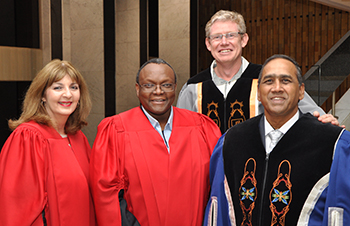Latest News Archive
Please select Category, Year, and then Month to display items

The University of the Free State (UFS) wishes to confirm that the following financial concessions have been made to enable students to register for the 2024 academic year:
- Students with confirmed NSFAS funding:
- Students with a confirmed National Student Financial Aid Scheme (NSFAS) funding allocation for 2024 with a debt of R20 000 and less may register fully without making any payments.
- First-time entering students (FTENS) with a confirmed NSFAS funding allocation for 2024 may register fully without any payments.
- Students with a confirmed NSFAS funding allocation for 2024 with a debt of R30 000 and less may register provisionally and pay the required fees* for provisional registration.
- South African self-paying (NON-NSFAS) students:
- SA students with a debt of up to R500 may register fully without making any payments.
- SA students with a debt of up to R30 000 may register provisionally and pay the required fees* for provisional registration.
- FTENS not on UFS funded list:
- Students who are not on the funded list but report that they have been approved on their portal must contact our
 Financial Aid Offices urgently so that the university can escalate to NSFAS.
Financial Aid Offices urgently so that the university can escalate to NSFAS.
The university will have continuous engagement with the National Financial Aid Scheme (NSFAS) to resolve outstanding matters. The university’s Financial Working Group (FWG) will meet regularly to determine how it can best assist students taking into consideration the financial constraints of the university.
Prof Tim Murithi calls for Africa to design new global order
2016-06-02

From left: Prof Heidi Hudson, Head of Centre for Africa
Studies (CAS); Prof Tim Murithi, Extraordinary Professor
at CAS; Prof Lucius Botes, Dean of the Faculty of
the Humanities; and Prof Prakash Naidoo, Principal of
Qwaqwa Campus.
Photo: Stephen Collet
“What do Africans have to say about the remaking of the global order?” was the opening question of Prof Tim Murithi’s lecture which was hosted by the Centre for Africa Studies (CAS) of the University of the Free State (UFS) to celebrate Africa Day on 25 May 2016.
The annual Africa Day Memorial Lecture, entitled: Africa and the Remaking of the Global Order, doubled as Prof Murithi’s inaugural lecture. He is CAS’s newly-appointed Extraordinary Professor, as well as the Head of the Justice and Reconciliation in Africa Programme at the Institute for Justice and Reconciliation in Cape Town. He made a compelling argument for the need for Africa to exert an active influence on international narratives of peace, governance, justice, and reconciliation.
“If we are waiting for American leadership to get us out of the quagmire of a situation we are in, we will be waiting for a long time,” said Prof Murithi.
The Head of the Centre, Prof Heidi Hudson, concurred with Prof Murithi’s suggestion of devising African solutions for African problems. She quoted Audre Lorde’s well-known assertion that “The master’s tools will never dismantle the master’s house.”
Remembering 1963
Over five decades ago, on 25 May 1963, the Organisation of African Unity was formed, and was renamed the African Union in 2002. Africa Day marks this pivotal point in the continent’s history. On this day, we reflect on the continent’s journey into democracy, peace, stability and socio-economic development. It is also an opportunity to celebrate African identity and heritage.
Continent-building dialogues
The UFS Sasol Library celebrated Africa Day with a book launch. Facets of Power. Politics, Profits and People in the Making of Zimbabwe's Blood Diamonds by Tinashe Nyamunda is a reflection of some of the challenges that Zimbabwe continues to face. It details the disadvantaged position which the country finds itself in due to greed, maladministration, and corruption, despite possessing large deposits of minerals.
In celebration of Africa Month, CAS has held a series of lectures by esteemed scholars from across the globe. Earlier in the month, Prof Henning Melber presented lectures on Namibia’s independence and the African middle class. Kevin Bloom and Richard Poplak unpacked the issues surrounding Africa’s continental shift, while Prof Joleen Steyn Kotze focused on the possible fall of the African National Congress.